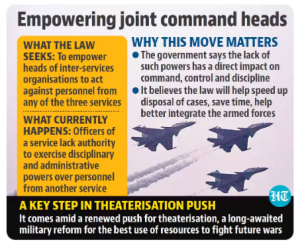
Context: Recently, Rajya Sabha passed the Inter-Services Organisation (Command, Control & Discipline) Bill, 2023.
Highlight of Bill
- Aim: To provide commanders-in-chief and officers-in command of Inter-Services Organisations (ISOs) with disciplinary and administrative power over personnel from other forces serving in such establishments.
- Objective: It will ensure better coordination among the three services and bolster the integrated structure.
- Present Condition: Currently, armed forces personnel are governed in accordance with the provisions contained in their specific Service Acts – Army Act 1950, Navy Act 1957 and Air Force Act 1950.
Feature of the Bill:
| Constituting Inter-services Organisation (ISO): |
- Existing Inter-services Organisations will be deemed to have been constituted under the Bill.
- These include the Andaman and Nicobar Command, the Defence Space Agency, and the National Defence Academy.
- Personnel of ISO will belong to at least two of the three services: the army, the navy, and the air force.
- ISO will also include a Joint Services Command, which may be placed under the command of a Commander-in-Chief.
|
| Control of Inter-services Organisations: |
- The Bill empowers the Commander-in-Chief or the Officer-in-Command of an ISO to exercise command and control over the personnel serving in or attached to it.
- He would be responsible for maintaining discipline and ensuring proper discharge of duties by the service personnel.
|
| Role of Government: |
- Superintendence of an ISO will be vested in the central government.
- The government will issue directions to such organisations on grounds of national security, general administration, or public interest.
- Other forces under central government: The central government may notify any force raised and maintained in India to which the Bill will apply.
- This would be in addition to army, navy, and air force personnel.
|
| Eligibility of Commander-in-Chief: |
- A General Officer of the regular Army (above the rank of Brigadier). Or
- A Flag Officer of the Navy (rank of Admiral of the Fleet, Admiral, Vice-Admiral, or Rear-Admiral). Or
- An Air Officer of the Air Force (above the rank of group captain).
|
| Function of Commander-in-Chief: |
- He will be empowered to exercise all disciplinary and administrative powers vested in:
(i) General Officer Commanding the Army,
(ii) Flag Officer Commanding-in-Chief of a Naval Command,
(iii) Air Officer Commanding-in-Chief of an Air Command,
(iv) any other officer/authority specified in the service Acts,
(v) any other officer/authority notified by the government. |
| Commanding Officer (CO): |
- CO will be in command of a unit, ship, or establishment.
- The officer will also perform duties assigned by the Commander-in-Chief or Officer-in-Command of the Inter-services Organisation.
- CO will be empowered to initiate all disciplinary or administrative actions over the personnel appointed, posted, or attached to that ISO.
|
News Source: Indian Express
![]() 9 Aug 2023
9 Aug 2023

